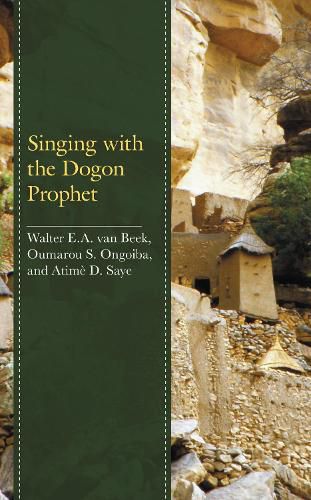Readings Newsletter
Become a Readings Member to make your shopping experience even easier.
Sign in or sign up for free!
You’re not far away from qualifying for FREE standard shipping within Australia
You’ve qualified for FREE standard shipping within Australia
The cart is loading…






In the Dogon funeral proceedings, a major song cycle called baja ni is performed in a session of at least seven hours. The texts of the chants are attributed to a legendary figure called Abire, who as a blind singer in the nineteenth century roamed the heartland of the Dogon. The baja ni songs have escaped scholarly attention thus far. Singing with the Dogon Prophet by Walter E.A. van Beek, Oumarou S. Ongoiba, and Atim D. Saye provides their first publication in English as well as an analysis of these songs. These texts deal with the relations between man and woman, man’s ambivalent dependency on the otherworld, and with life and death; the whole night performance is one of the high points of the funeral. Additionally, Abire is a prophet, and during his life has uttered a great number of prophecies on a wide range of topics, from local issues to the relation of the Dogon with the Fulbe herdsmen, and from the arrival of the colonials to ecological transformation. This book examines how these prophecies with these songs offer an inside view of the way the Dogon construct the present in a continuous dialogue with their past and their projected future.
$9.00 standard shipping within Australia
FREE standard shipping within Australia for orders over $100.00
Express & International shipping calculated at checkout
In the Dogon funeral proceedings, a major song cycle called baja ni is performed in a session of at least seven hours. The texts of the chants are attributed to a legendary figure called Abire, who as a blind singer in the nineteenth century roamed the heartland of the Dogon. The baja ni songs have escaped scholarly attention thus far. Singing with the Dogon Prophet by Walter E.A. van Beek, Oumarou S. Ongoiba, and Atim D. Saye provides their first publication in English as well as an analysis of these songs. These texts deal with the relations between man and woman, man’s ambivalent dependency on the otherworld, and with life and death; the whole night performance is one of the high points of the funeral. Additionally, Abire is a prophet, and during his life has uttered a great number of prophecies on a wide range of topics, from local issues to the relation of the Dogon with the Fulbe herdsmen, and from the arrival of the colonials to ecological transformation. This book examines how these prophecies with these songs offer an inside view of the way the Dogon construct the present in a continuous dialogue with their past and their projected future.